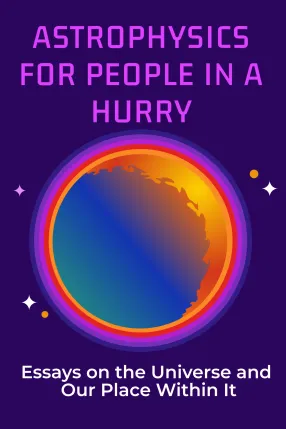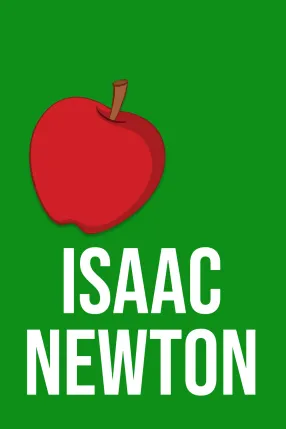Physics books
Last updated: November 2, 2025
Physics is the science that reveals the secrets of our world. Studying physics helps us understand important concepts, from light bulbs to how our brains function. Although many people find physics complicated, this list includes books that are easy to read and understand.

Astrophysics for People in a Hurry
What is Astrophysics for People in a Hurry about?
Have you ever wanted to learn more about the cosmos, its history, and the laws by which it abides? If so, “Astrophysics for People in a Hurry” by Neil deGrasse Tyson is the perfect next read for you. It explains everything you might want to know about the Universe in easy terms, so you don’t have to be a scientist to understand it.

"Surely You're Joking, Mr. Feynman!"
What is "Surely You're Joking, Mr. Feynman!" about?
Science is not just about atoms, test tubes, and boring formulas. In the book “Surely You're Joking, Mr. Feynman!,” Richard Feynman will prove it by telling you anecdotes from his life related to science and curiosity. Here, you will discover a light, humorous, and inspiring book that will teach you about science and make your evening full of laughter and joy.

What is Life? With Mind and Matter and Autobiographical Sketches
What is What is Life? With Mind and Matter and Autobiographical Sketches about?
Erwin Schrödinger's What is Life? is an intellectual journey at the crossroads of physics and biology. Schrödinger, a Nobel laureate, masterfully unravels the behavior of living organisms, their cells, and nervous systems through the lens of physics. The book shedds light on how the laws of physics applied to atoms and molecules forge the pathway to the discovery of DNA and explores the philosophy of human cognition.

The Future of the Mind
What is The Future of the Mind about?
The human brain might be the most mysterious object in the world. In his book The Future of the Mind, Michio Kaku offers a glimpse into the future of the human brain and neuroscience technology. Read on to find out more about telepathy, mental illness, alien consciousness, and much more.

Death by Black Hole
What is Death by Black Hole about?
"Death by Black Hole" is a collection of essays on the mysteries of the Universe. Even if you have very limited knowledge of astrophysics, Neil deGrasse Tyson's style of narration will make the terms accessible. You’ll explore numerous cosmic themes with humor and ease.

The Elegant Universe
What is The Elegant Universe about?
Ever wondered what the universe is really made of? In "The Elegant Universe," Brian Greene tells you about everything — superstrings, hidden dimensions, and quantum weirdness. Imagine if every particle, every atom, every quark wasn’t a point but a tiny vibrating string. Greene explains how this revolutionary idea might finally unite the two clashing giants of physics: Einstein’s relativity and quantum mechanics.

Genius
What is Genius about?
If you are interested in biographies of famous scientists, you will definitely like the book "Genius," in which James Glick explores the life and achievements of Richard Feynman. This young man, with a great sense of humor and charisma, became the one whose ideas revolutionized quantum mechanics. Discover the brilliant man who created quantum electrodynamics and won the Nobel Prize in Physics.

The Strangest Man
What is The Strangest Man about?
Einstein's colleague and exceptional scientist Paul Dira left little information about himself. Even though this man made incredible discoveries and equations that changed physics, he was very private and secretive. In "The Strangest Man," Graham Farmelo introduces you to Paul Dirac and sheds a little light on the life of a genius.

The Grand Design
What is The Grand Design about?
In "The Grand Design," Stephen Hawking and Leonard Mlodinow boldly deal with life’s biggest question: Why is there something rather than nothing? They argue that the laws of physics, specifically quantum theory and gravity, may explain how the universe could’ve created itself. The duo uses humor and clear analogies to explain groundbreaking ideas like M-theory, which suggests that our universe may be just one of many. Be reaady for many more!

Faraday, Maxwell, and the Electromagnetic Field
What is Faraday, Maxwell, and the Electromagnetic Field about?
In science, it’s not uncommon for brilliant people to collaborate for experiments or development of theories. Still, few tandems were as influential as Faraday and Maxwell who worked on electromagnetic field concept. This book walks the readers through the lives of these scientists and the intriguing details of their work.

The Fabric of the Cosmos
What is The Fabric of the Cosmos about?
Forget everything you thought you knew about space and time! Brian Greene’s "The Fabric of the Cosmos" will leave you questioning the very fabric of reality. Is time real, or just an illusion? Is space empty or full of strange quantum fields? Greene masterfully unpacks these complex ideas, taking readers from Newton’s clockwork universe to Einstein’s spacetime and beyond.

Einstein: His Life and Universe
What is Einstein: His Life and Universe about?
Walter Isaacson's book "Einstein" chronicles the life of the scientist who transformed our knowledge of the universe. This is the tale of Einstein's insatiable curiosity, personal hardships, and groundbreaking scientific discoveries. If you've ever wondered what lies behind the simple word “genius,” this book is for you.

From Science to God
What is From Science to God about?
There's a constant debate: can science and spirituality actually coexist? Physicist Peter Russell says yes, and in "From Science to God", he explores the connection between the universe and consciousness. Russell answers to all the most facsinating questions. What is the nature of reality? Is the mind separate from the physical world? Using his experience, he intertwins quantum physics, neuroscience, and spiritual insight.

The Science of Interstellar
What is The Science of Interstellar about?
If you love "Interstellar", this book is a valuable guide to the science this film is based on. It is written by Nobel Prize-winning astrophysicist Kip Thorne, so the book is incredibly detailed and comprehensive. Yet don’t let the scientific terms scare you away – once you get into it, you’ll see that this science is fascinating.

Isaac Newton
What is Isaac Newton about?
Dive into the captivating world of Isaac Newton through the eyes of James Gleick. In his book, “Isaac Newton”, Gleick brings to life the remarkable journey of this brilliant mind that changed the course of history.

Space
What is Space about?
Written by Dr Becky Smethurst, an astrophysicist at the University of Oxford, this book helps the readers understand the basics about the space. If the worders of the Universe seem incomprehensible to you, "Space" can make them more accessible. Learn about space exploration, black holes, and much more.
FAQ


Find out how to learn quickly and efficiently with our app!
Incorporate the habit of reading into your daily life.